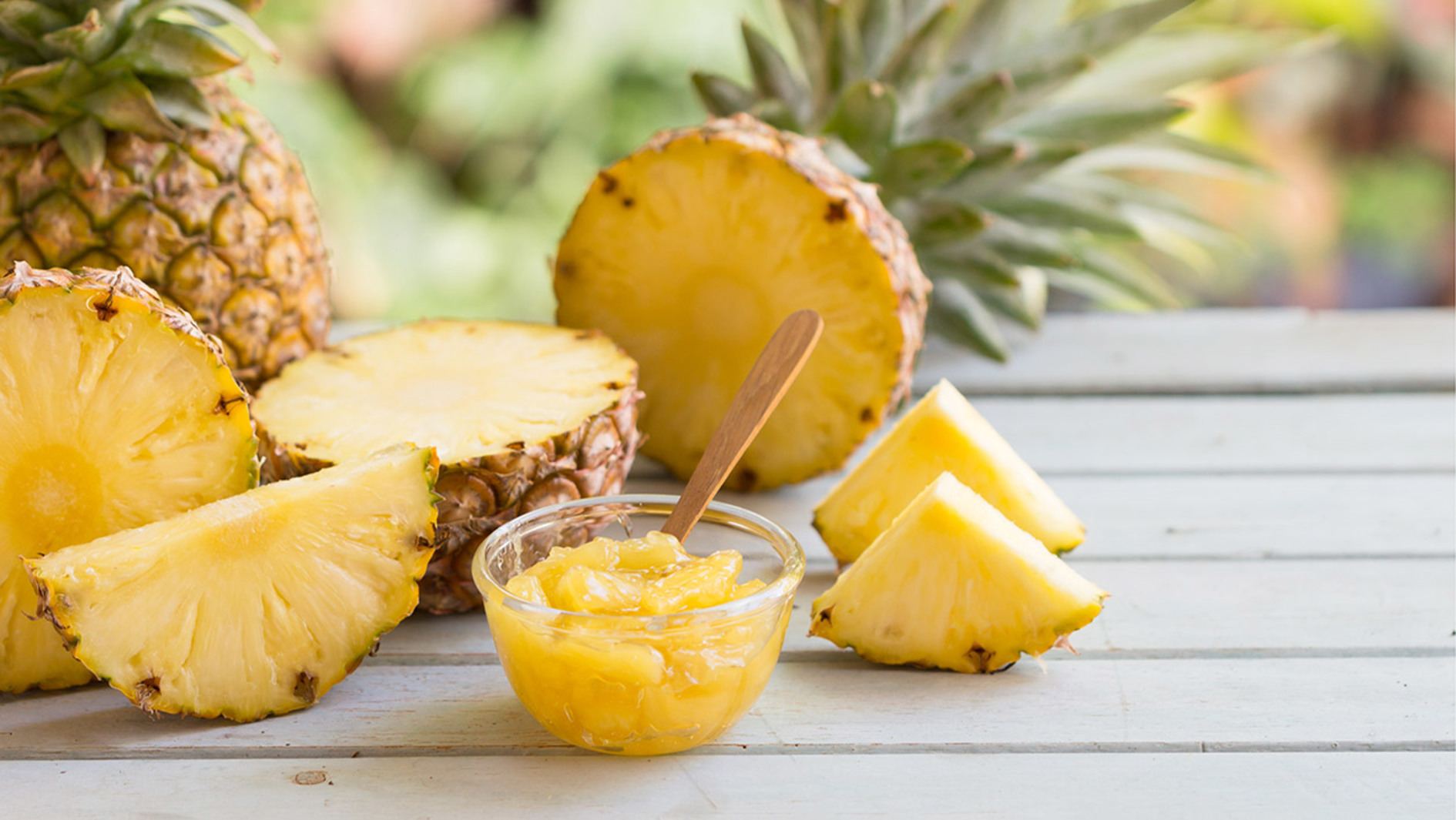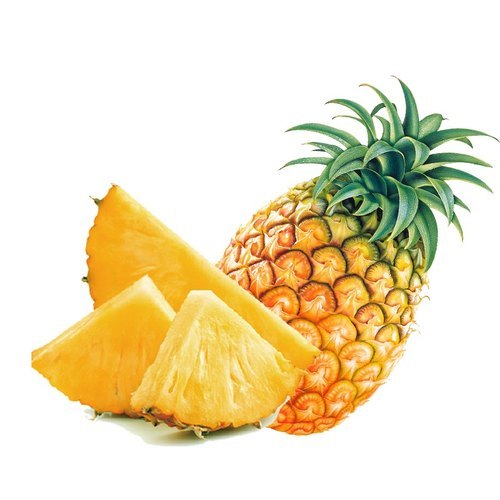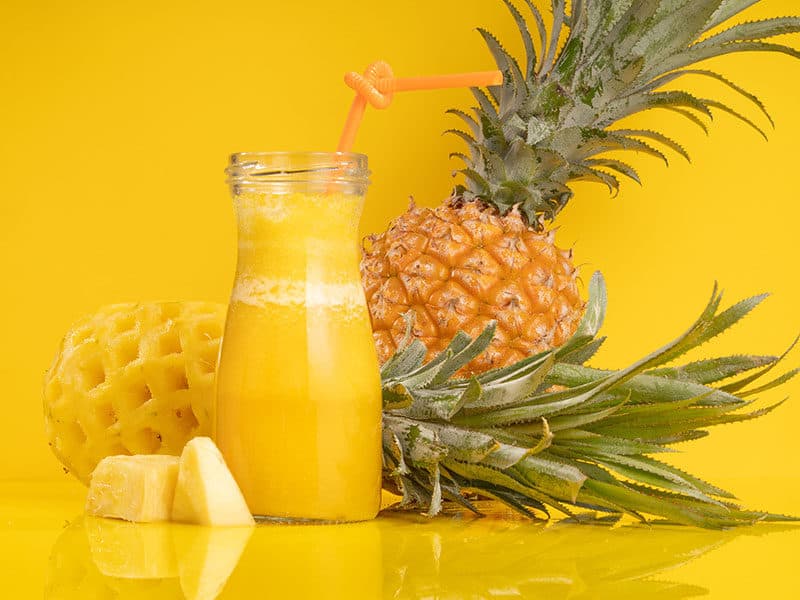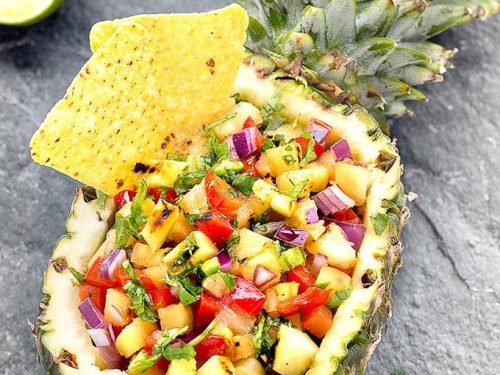
Pineapple: Nutrition facts and health benefits
Pineapple (Ananas comosus) is an incredibly delicious, healthy tropical fruit. It’s packed with nutrients, antioxidants, and other helpful compounds, such as enzymes that can protect against inflammation and disease. It’s commonly eaten baked, grilled, or freshly cut.
Pineapples grow as a small shrub; the individual flowers of the unpollinated plant fuse to form a multiple fruit. The plant is normally propagated from the offset produced at the top of the fruit, or from a side shoot, and typically mature within a year.

The wild plant originates from the Paraná–Paraguay River drainages between southern Brazil and Paraguay. Little is known about its domestication, but it spread as a crop throughout South America. Archaeological evidence of cultivation/use is found as far back as 1200 – 800 BC (3200-2800 BP) in Peru and 200BC – AD700 (2200-1300 BP) in Mexico, where it was cultivated by the Mayas and the Aztecs.
By the late 1400s, cropped pineapple was widely distributed and a stable component of the diet of Native Americans. The first European to encounter the pineapple was Columbus, in Guadeloupe on 4 November 1493.The Portuguese took the fruit from Brazil and introduced it into India by 1550.The ‘Red Spanish [es]’ cultivar was also introduced by the Spanish from Latin America to the Philippines, and it was grown for textile use from at least the 17th century
Pineapple: 8 Impressive Health Benefits
Pineapple and its compounds are linked to several health benefits, including improvements in digestion, immunity, and recovery from surgery.
Here are 8 impressive health benefits of pineapple.

1. Loaded with nutrients
Pineapples are low in calories but boast an impressive nutrient profile. Just 1 cup (165 grams) of pineapple chunks contains the following nutrients.
- Calories: 83
- Fat: 1.7 grams
- Protein: 1 gram
- Carbs: 21.6 grams
- Fiber: 2.3 grams
- Vitamin C: 88% of the Daily Value (DV)
- Manganese: 109% of the DV
- Vitamin B6: 11% of the DV
- Copper: 20% of the DV
- Thiamine: 11% of the DV
- Folate: 7% of the DV
- Potassium: 4% of the DV
- Magnesium: 5% of the DV
- Niacin: 5% of the DV
- Pantothenic acid: 7% of the DV
- Riboflavin: 4% of the DV
- Iron: 3% of the DV
Pineapples also contain trace amounts of phosphorus, zinc, calcium, and vitamins A and K.
As you can see, this fruit is particularly rich in vitamin C and manganese. Vitamin C is essential for immune health, iron absorption, and growth and development, while manganese offers antioxidant properties and aids in growth and metabolism.
Antioxidants help prevent oxidation in your body, which may help ward off inflammation that can lead to cancer and other chronic diseases.
2. Contains disease-fighting antioxidants
Pineapples are not only rich in nutrients but also loaded with antioxidants — molecules that help your body ward off oxidative stress.
Oxidative stress is caused by an abundance of free radicals, unstable molecules that cause cell damage often linked to chronic inflammation, weakened immune health, heart disease, diabetes, and certain cancers.
Pineapples are especially rich in antioxidants called flavonoids and phenolic compounds. Two rat studies show that pineapple’s antioxidants may have heart-protective effects, though human research is lacking .
What’s more, many of the antioxidants in pineapple are considered bound antioxidants, meaning that they produce longer-lasting effects.
3. May aid digestion
Interestingly, this fruit contains a group of digestive enzymes called bromelain that may ease the digestion of meat. Once protein molecules are broken down, your small intestine can more easily absorb them.
This is especially helpful for people with pancreatic insufficiency, a condition in which the pancreas cannot make enough digestive enzymes. What’s more, pineapples are a good source of fiber, which aids digestive health.
4. May reduce your risk of cancer
Cancer is a chronic disease characterized by uncontrolled cell growth. Its progression is commonly linked to oxidative stress and chronic inflammation. Several studies note that pineapple and its compounds, including bromelain, may reduce cancer risk by minimizing oxidative stress and reducing inflammation.
For instance, one test-tube study found that bromelain suppressed the growth of breast cancer cells and stimulated cell death, while a mouse study found that bromelain enhanced the effects of anticancer therapy.
Furthermore, older test-tube and animal studies have found that bromelain may stimulate the immune system to produce molecules that make white blood cells more effective at suppressing cancer cell growth and eliminating cancer cell.
Furthermore, older test-tube and animal studies have found that bromelain may stimulate the immune system to produce molecules that make white blood cells more effective at suppressing cancer cell growth and eliminating cancer cell.
5. May boost immunity and suppress inflammation
They contain a wide variety of vitamins, minerals, and enzymes such as bromelain that may collectively improve immunity and reduce inflammation.
In an older 9-day study, 98 healthy children ate either no pineapple, roughly 1 cup (140 grams) of pineapple, or roughly 2 cups (280 grams) of pineapple daily.
A 30-day study in 40 adults with chronic sinusitis found that those taking a 500-mg bromelain supplement recovered significantly faster than those in the control group.
Still, further research in humans is needed. Bear in mind that neither pineapple nor its compounds can cure or prevent COVID-19.
6. May ease symptoms of arthritis
Arthritis affects more than 54 million adults in the United States alone. Many types of arthritis exist, but most involve joint inflammation. Bromelain’s anti-inflammatory properties may provide pain relief for those with inflammatory arthritis.
One study found bromelain supplements to be as effective in easing osteoarthritis in the lower back as regular pain treatment. All the same, more human research — on pineapples, not just bromelain — is needed.
7. May speed recovery after surgery or strenuous exercise
Eating pineapple may reduce the time it takes to recover from surgery or exercise. Moreover, proteases such as bromelain may speed muscle recovery after strenuous exercise by reducing inflammation around the damaged muscle tissue. Nonetheless, more research is needed before this compound can be recommended for post-training recovery.

8. Easy to add to your diet
Pineapples are sweet, convenient, and easy to add to your diet.
The fresh fruit is easy to find in many grocery stores and markets, even out of season. You can buy it canned, dehydrated, or frozen year-round.

You can enjoy pineapple on its own, in smoothies, on salads, or on homemade pizzas. Here are a few fun recipe ideas that feature pineapple:
- Breakfast: smoothie with pineapple, blueberry, and Greek yogurt
- Salad: tropical roast chicken, almonds, blueberries, and pineapple atop lettuce or other greens
- Lunch: homemade Hawaiian burgers (beef burgers with a pineapple ring)
- Dinner: pineapple fried rice and seitan
- Dessert: homemade pineapple whip (frozen pineapple chunks blended with a splash of coconut milk and a dash of lemon juice)
The bottom line
People with diabetes should be mindful of serving sizes to keep their blood sugar stable (49Trusted Source).
However, even in people without an allergy or diabetes, eating too much pineapple — more than a few servings per day — may have unintended side effects.
For instance, bromelain may affect blood clotting. Therefore, people who take blood thinners should eat pineapple in modest amounts (50Trusted Source, 51Trusted Source, 52Trusted Source).
Those sensitive to bromelain may also experience tongue burning or itching and even nausea or diarrhea — though these downsides are anecdotal and haven’t been studied scientifically.
Some people claim that eating a lot of unripe pineapple causes stomach upset, nausea, and diarrhea. Again, this hasn’t been studied, but it’s always best to select ripe pineapple. The flesh should be a light to medium yellow.
Source

I love it eat this .. so yummy
Pineapple is loaded with nutrients and antioxidants…. great 👍
Thanks for sharing
Thanks for sharing knowledge!
Good Thank you for your sharing
I like pineapple.
Great thanks for your sharing.
Good morning
Like pineapple it advantage a lot of our health.
🍍🍍🍍
Yummy 😋
I like it.😋
I like it😋
Thank you for your sharing
I like pineapple
I like fresh fruits.
I like it😋😋😋
Pineapple is my favorite fruit that i would love to eat fresh with honey and a bit of fresh lime juice. Thanks so much for sharing its health benefits.
မှားမန့်တာ😂
Me too.😁
😋😋I like it.
Me too.😁
I like it
နာနတ်သီး ကြိုက်တယ်